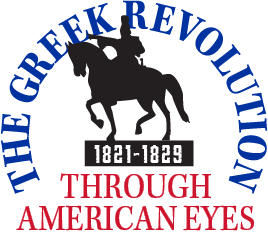Samuel Gridley Howe in Greece
Americans in Foustanellas

(Courtesy of the National Historical Museum, Athens)
This portrait of Samuel Gridley Howe (1801–76), painted by John Elliot (1858–1925) around 1870, shows him in a foustanella, the dress of a Greek soldier.
Samuel Gridley Howe (1801–76) was twenty-three and a recent graduate of Brown University and of the Harvard Medical School when, in November 1824, he left Boston for Greece, awestruck by the revolution that had begun in 1821. Imbued with the time’s Romantic spirit embodied in the exploits of Lord Byron, the young physician became an American champion of Greek independence.
Fighting a guerilla war, the Greek rebels had success against the Ottomans, but in 1823, taking advantage of Greek factionalism, Pasha Ibrahim led Egyptian forces into the Morea, where they joined with Turkish fighters. When Howe arrived in Greece in January 1825, he found himself amidst what appeared to be the defeat of Greece’s quest for independence. Howe participated in the fighting in Nauplion and later served as a physician on the islands of Crete, and then Hydra, where he became a surgeon on the ship Karteria. In February 1827, Howe reported in his journal that he had killed a Turk and was not sure whether it evoked pleasure or pain.
In late 1827, Howe shifted his attention to humanitarian relief on the islands of Astros and Poros and in the eastern Morea. After the defeat of the Egyptian navy at Navarino by the British, French, and Russians (October 1827) and the Ottomans on the mainland, Howe returned home, where he helped the Boston, Philadelphia, and New York committees raise money and supplies. In 1828, he published An Historical Sketch of the Greek Revolution, and returned again to Greece, where he established an orphanage in Aegina and a farm colony near Corinth, known as Columbia or Washingtonia. In Greece, Howe learned to champion a gallant cause and the persistence necessary to achieve change. He became a hero, a Chevalier of the Greek Legion of Honor, but most of all a humanitarian.

(Painting by Jane Stuart. Courtesy of Digital Public Library of America)



(Courtesy of the National Gallery, Athens; Stavros Psiroukis)
The Reception of Lord Byron at Missolonghi by Theodoros Vryzakis (1814–78), 1861.
If you compare the Greek regulars to our militia, and their irregulars to our Indians, you will come near the truth…they prefer to wait the attack of an enemy, and to surprise by ambuscades. Then they pitch upon some defile through which the enemy must pass, hide themselves among the rocks and stones, and patiently await his coming…every Greek soldier thinks it necessary that he should have a pair of pistols and a yataghan stuck in his belt.

(“Nicholas Metropoulos” is reproduced by kind permission of the Travel Accounts Book Collection ©Onassis Library, Onassis Foundation)
A romantic image of the Greek revolutionary klepht (Nikolaki Metropoulos) hoisting the revolutionary flag at Salona (Amphissa) on Easter day 1821, by Louis Dupré.
There was something exceedingly wild, romantic, and enticing about the life and conditions of the Klepht.

(The camp of Karaiskakis, oil painting by Theodoros Vryzakis, Athens 1855. Courtesy of National Gallery, Athens; Stavros Psiroukis)
Mavrocordatos appears perfectly cool, nor could I see the least appearance of that cowardice with which he has been charged. I am now sitting writing in his quarters, where he is transacting business with his usual precision and despatch; he said to me, “I do not wish for the enemy to come, but would not give a pin to have them keep away. . .
April 24, 1825

(Courtesy of the National Historical Museum, Athens)
Called on Konduriotes, the President of Greece. The simple-hearted old man seemed glad to see me again, as he thought I was lost. His mansion (for Greece) is a splendid one; and would not dishonour a civilized country. Some idea of his ignorance of the world may be formed from his asking me if I began to study English with Masson, and whether I could speak it any. And he seemed surprised when told it was an American’s mother tongue.
June 19, 1825

(Public domain via Hathi Trust)

(Public domain via Hathi Trust)
By 1827, interest in the Greek Revolution was beginning to wane in America even as the humanitarian crisis raged in Greece. Samuel Gridley Howe wrote An Historical Sketch of the Greek Revolution and embarked on a lecture circuit to renew American interest in the cause, and to inspire contributions for his humanitarian efforts. He dedicated the work to leading members of the Greek Relief Committees of Boston and Philadelphia.
(Courtesy of the Aikaterini Laskaridis Foundation, Piraeus)
Howe accompanied President Kountouriotis and future President Alexandros Mavrokordatos to Hydra where he learned about the internal political struggle among the Greeks in the midst of a revolution. “Vue de la Ville d’Hydra,” Antoine-Laurent Castellan, 1808.

